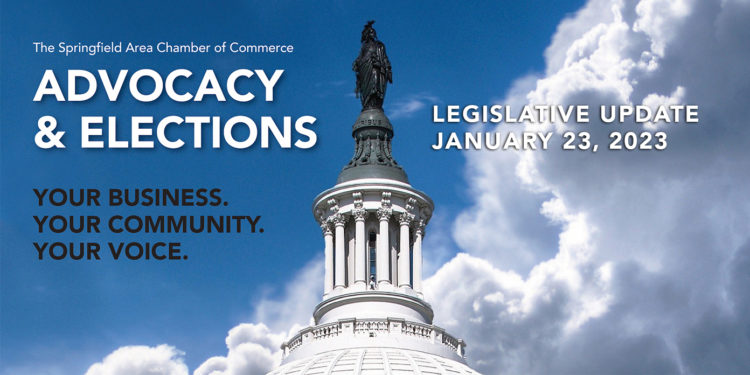Legislative Update: January 23, 2023

We’re monitoring Oregon’s 2023 legislative session for issues of impact and interest to our members. Here’s the latest update from our legislative counsel at the Oregon State Chamber of Commerce (OSCC).
The wheels of the 2023 legislative session are turning slowly. Not too much to report this week as committees are slowly starting to sift through bills – none of which are controversial here at the outset of session.
Bills, bills, bills
To date, about 1,950 pieces of legislation have been introduced. The majority of these bills are “placeholder” bills that simply serve as empty vehicles ready to receive amendments. We have not observed many viable bills to date that either represent significant opportunities for the business community, or conversely, significant threats.
The sheer volume of “placeholder” bills is an emerging phenomenon – and not a good one. It represents that fact that OSCC and others will have to be on their toes for 11th hour amendments into otherwise innocuous looking bills that might have major impact on local business communities.
Budget backdrop
It is important to reiterate that the 2023 session will be dealing with a modest revenue shortfall. As of now, there is a projected $560 million current service level budget deficit on a $30 billion General Fund. Although this is only about a 1.5% budget deficit, it marks a significant departure from the previous 3-4 years in which the legislature had a massive surplus of cash that allowed it to fund a myriad of proposals. This session will revert back to the norm with serious analysis and scrutiny applied to any measure that costs money.
Revenue needs
The state will have some revenue needs that will make the budget environment even more challenging. First and foremost, Oregon needs to pay $1 billion for the Interstate Bridge Replacement proposal that would seek to rebuild the I-5 Bridge that connects Oregon with Washington. Second, there will likely be a significant shortfall in the state’s Medicaid budget that will require more cash. Finally, there is disagreement about the level of funding that the state’s K-12 system will require. While analysts believe the system needs $9.5 billion to keep whole, education advocates say the K-12 system will really require closer to $10.3 billion. Also in the mix: an extra $300 million intended to lure semi-conductor manufacturers to conduct their operations in Oregon.
Governor’s Budget
Governor Kotek has indicated that her top three policy priorities for 2023 include more affordable housing stock, a better mental health system, and improvements in public education.
Legislative leadership has also outlined key complementary priorities which include replacement of the Interstate Bridge, incentives for the semiconductor industry, implementation of Measure 114 gun control legislation, and shoring up the state’s public defense budget.
Agency priorities
Something very unique to this session is that we have not yet seen the release of any state agency bills. What makes this unique is that in most legislative sessions, agency bills are among the very first to be introduced and among the very first to be considered by legislative committee
Session timelines
The session deadlines for 2023 are more aggressive than in sessions past, which means there is a high likelihood that there will be fewer bills than usual that make it through the legislature.
- February 1st is the deadline for bills to be introduced to implement the Governor’s budget.
- February 21st is the deadline for legislators to submit any requests for legislation.
- March 17th is the first meaningful procedural scheduling deadline. Any bill not scheduled for a committee ‘work session’ by this date is considered dead.
OSCC Bill Tracking
OSCC will use this space to notify Chambers of pending legislation that both have a reasonable chance of passage and have impact on local business communities. Although there are currently a number of bills at this date that would have impact on local business communities, in some cases very positive impact, we don’t believe these bills will be considered.
For instance, there are a number of bills that would remove small businesses from being subjected to the CAT tax. Unless there is a significant shift in the political discussion, we don’t believe these bills will be considered.
The Springfield Chamber of Commerce will be publishing the OSCC’s legislative updates weekly, or as received. Any opinions expressed or implied are those of OSCC and do not necessarily reflect those of the Springfield Chamber or its representatives. If you’d like more information, please visit our Advocacy & Elections Page.
Discover more from Springfield Bottom Line
Subscribe to get the latest posts sent to your email.






